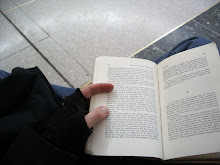Hot Topics
Two items for discussion from York University:
First, Teaching assistants (TA), contract faculty and graduate assistants on a work-to-rule campaign as of Monday 19 November. Please read the article for more information. It's a shame we're seeing this situation manifest, given the eleven-week-long TA strike in 2000-1, but the administration has its vision for the university and is dead-set on seeing it through.
Second, Tamil students stage forty-hour protest in Vari Hall, abstaining from eating, sleeping and talking. Again, please read the article for more information. For students concerned with signs being linked to "terrorist groups", be aware who labels whom "terrorist". It's easy for our government to affix this moniker to affiliations it dislikes; it's even easier for us to accept what our government tells us, for it saves us the trouble of exhuming a past the likes of which no amount of sterilization can wash away.
The last "hot topic" in this entry is the debate on "Black-focused" schools in Toronto, a topic contested on this evening's edition of The Agenda. All parties seemed to agree on the notion that the existing education system was failing Black students, among other ethnic students, and that sweeping changes were necessary if we are to continue with an integrated school structure. Naturally, as with most debates, each answer begot more questions, one of the more prevalent ones being thus: in a society in which we are trying to promote tolerance, acceptance and unity, should we be segregating students? Ms. Angela Wilson (whom you will see on the list of guests if you click the above link) raised a very important point: the White establishment only agreed to bus Black students to White schools as a means to convey an image of a people 'no longer racist'. Feel free to share your thoughts on her comment.
While watching the program, something occurred to me - granted, I am a white male raised in affluence, so by no means am I of any authority to speak on behalf of disenfranchised youth of African descent, but I wish to pose the following: could it be that these youth are receiving a head-start on education of the world, something no classroom, regardless of ethnocentric slant, is able to provide? For example, if a young African male in Toronto, or Detroit, or wherever, drops out of high school and enlists in a street gang, is he not doing what the rest of us end up being trained to do? I spent four years in university to end up hustling for some corporation who, at the end of the day, sent me home with my small cut. How is this any different from someone slinging rock on a street corner? Because a cadre of White males legitimized the former? It's time to call a spade a spade: a hustle is a hustle.
As always, I welcome any and all comments. I can only infer so much from what I see through my own eyes; I am always interested to see the world through the eyes of others. Feel free to share your thoughts.




